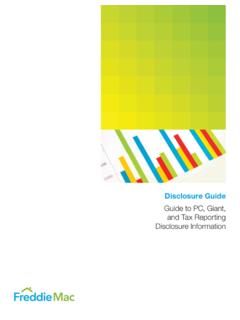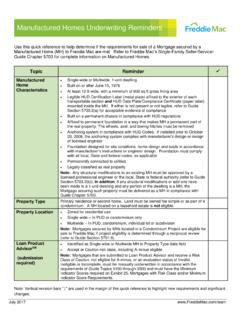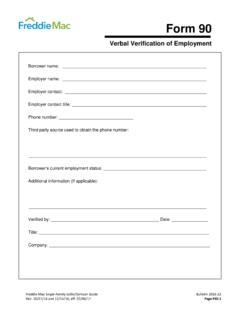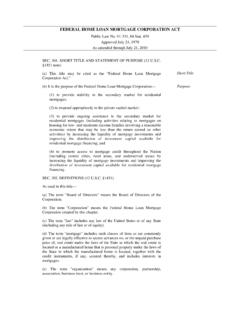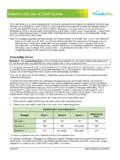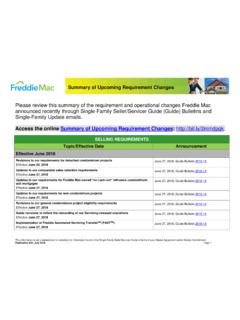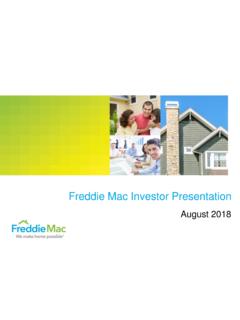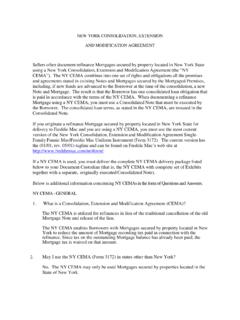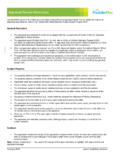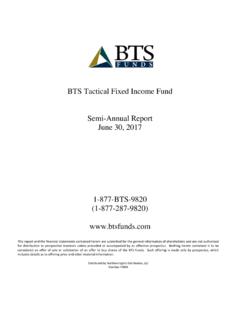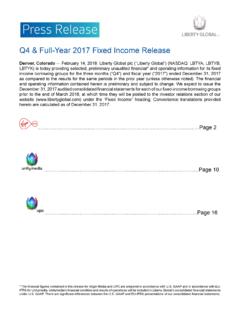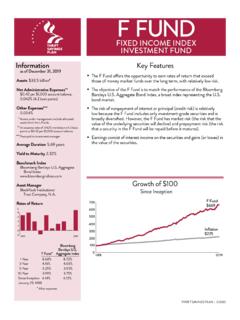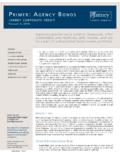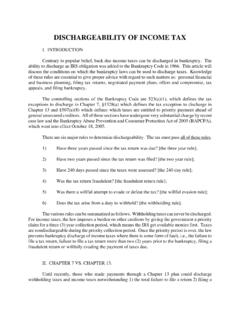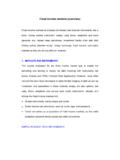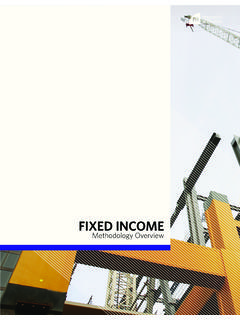Transcription of Glossary of Fixed Income Market Terminology
1 Glossary of Fixed Income Market Terminology Investor Research & Communications Page 1 of 12 All-In The final price or yield cost to issuers after paying underwriting fees to the dealer. Alt-A Mortgage collateral that is superior to sub-prime pools, but inferior to prime pools; often as result of lack of documentation and perhaps a small credit-related blemish. Alt-A is often considered a gray area due to the lack of a definitive difference between these loans and prime or A-minus loans apart from the difference in documentation. As a rough guide (but by no means hard and fast), a prime loan might have a FICO score in the 700s; an A-minus loan s FICO score might be in the 620-700 range, while sub-prime scores would be below A-minus.
2 American Call An option type where the option buyer can exercise the option on any date on or after the first exercise date. Announcement Date The date that a company announces the size and maturity of their upcoming debt security issue. ARM (Adjustable Rate Mortgage) A mortgage with a coupon rate that adjusts periodically on the basis of variations in a designated reference index; most ARMs have periodic and lifetime caps and floors. At-the-Money An option is at-the-money if the strike price equals the Market price of the underlying security. Back Up The yield, spread or price of a security is said to back up when it gets more expensive or costly from the issuer s perspective.
3 In other words, if the security s yield becomes higher or its price lower, the security might be said to have backed up in price. Basis Point / Bps / Beep One one-hundredth of one percent; used to describe the amount of change in yield in debt instruments. Bermudan Call An option type where the option buyer can exercise the option on one or more pre-specified dates after and including the first exercise date, typically quarterly, semi-annually, or annually; the specific call dates frequently coincide with the coupon payment dates. Bid List List or inventory of securities held by an investor that is presented to dealers for them to quote prices at which they will purchase the securities from the investor.
4 Bid / Ask (Bid / Offer) Spread The difference in the best buying price/yield and the best selling price/yield for any given security; the dealer buys and the customer sells at the bid; the dealer sells and the customer buys at the ask/offer. BMA (Bond Market Association) The trade association representing the debt securities markets and global bond industry. Book The investor order book for a syndicated debt issue; investor orders are submitted by the lead underwriters and the other members of the selling group and recorded in the book. Broker Generic name for a securities firm engaged in both buying and selling securities on behalf of customers and its own account.
5 Bulge Bracket Dealers The very largest broker/dealers; usually associated with Wall Street, , Goldman Sachs, Merrill Lynch, Morgan Stanley, Salomon Smith Barney, Deutsche Bank. Glossary of Fixed Income Market Terminology Investor Research & Communications Page 2 of 12 Bullet Bond A debt security that cannot be redeemed prior to its maturity date. Burnout Mortgage Market phenomenon representing the tendency of mortgage pools to become less sensitive to interest rate changes as the pool seasons; the more the remaining loans in a pool have missed refinancing opportunities, the more burnt out it is to interest rates changes. Buy and Hold An investor who buys securities with the intention of holding them until maturity or a long period rather than selling them in secondary Market within a short-term timeframe.
6 Callable Bond A debt security that has an embedded call option that allows the issuer to redeem the security prior to its maturity date, often after an initial lockout period during which the security cannot be called. Canary Call A step-up bond that becomes non-callable when the first step has been reached. Carry Trade The strategy that involves the simultaneous trading of two securities in order to create two offsetting positions, one of which creates an incoming cashflow that is greater than the obligations of the other. Cash Settlement Typically same day settlement. Cash Transaction When a mortgage lender sells a pool of mortgage loans to Freddie Mac in exchange for cash.
7 Cash / Multi-lender Pools Pools formed by combining loans acquired by Freddie through different cash transactions as well as loans offered to Freddie via swap transactions in small-sized lots by different lenders. CDS (Credit Default Swap) A swap in which one party to the swap provides a guarantee for the benefit of a second counterparty to the swap with respect to the credit performance of a reference issuer on its debt obligations (typically of a stated seniority level , senior or subordinated etc.). The counterparty hedging against the risk of the reference issuer s default (the buyer of the CDS) makes periodic payments to the other counterparty (the CDS seller) for laying off this risk, while the CDS seller only makes a payment in the event of a default to compensate the buyer on a specified notional amount of the debt obligation.
8 Cheap vs. Rich / Expensive A security is said to be cheap relative to a benchmark when it is attractively priced in terms of yield offered from an investor s viewpoint; a security is rich or expensive when it is less attractive in terms of yield to an investor. Cheapening vs. Richening A security is cheapening when its price is decreasing and its yield/OAS is increasing; a security is richening when its price is increasing and its yield/OAS is decreasing. Cheapest-to-Deliver / Worst-to-Deliver) The term used for the TBA collateral that will be delivered at the settlement date; sellers are permitted to deliver any TBA-qualifying collateral, but the optimal delivery for the TBA seller is to deliver the least attractive loans which would be the cheapest to buy.
9 CMO (Collateralized Mortgage Obligation) Used interchangeably with either REMIC or Multiclass Security; the term refers to a multiclass securities issue backed by mortgage loans, pools of mortgages, or even existing CMOs. In structuring a CMO, an issuer distributes cash flow from the underlying collateral over a series of classes (tranches), which constitute the multiclass securities issue. Each CMO consists of two or more tranches. CMO Issuer The Issuer of a CMO is the legal entity (also referred to as a Trust), which owns the underlying collateral and issues CMO securities to investors. Typically, the Issuer owns specific, identified collateral (such as pools of mortgages, individual mortgages, or even other CMOs, as well as combinations of the above).
10 The Issuer s name is often referred to as the deal, FHR 2425. Glossary of Fixed Income Market Terminology Investor Research & Communications Page 3 of 12 CMS (Constant Maturity Swap) A theoretical construction of par coupon swap curve where par coupon should be interpreted as referring to an at- Market swap. CMT (Constant Maturity Treasury) A theoretical construction of the Treasury yield curve relating to hypothetical par-priced Treasury securities. Concessions Generically, the fees paid to dealers for underwriting / selling our debt securities. This is the only portion of the total concession that a selling group dealer would earn on a Reference Notes transaction.
